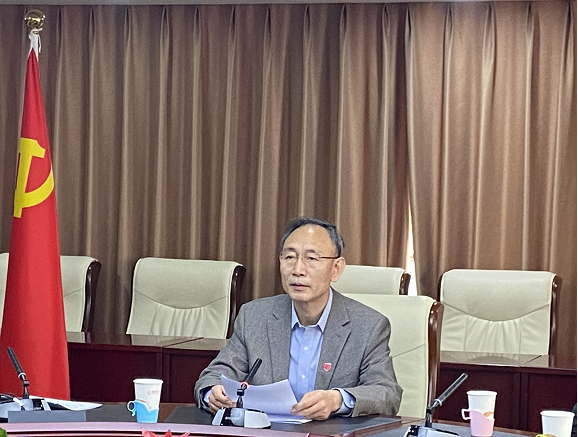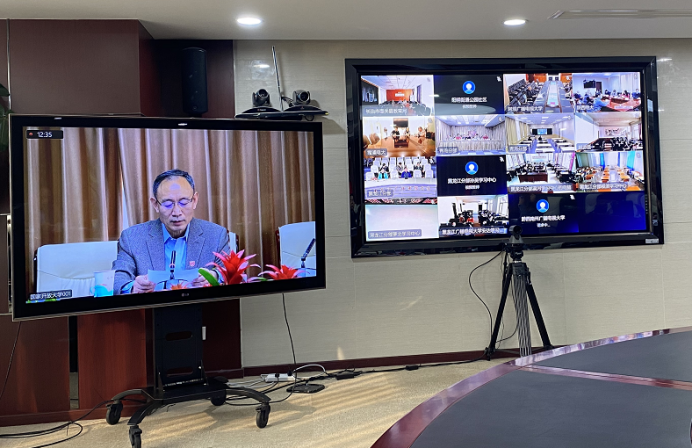 On the morning of 11 November 2020, in order to implement the guiding principles of the Notice of the General Office of the Ministry of Education (MOE) on the Summary of Community Education Work during the 13th Five-Year Plan Period, the MOE Research and Training Centre for Community Education, established within the Open University of China (OUC), organised a video meeting to summarise community education work during the 13th Five-Year Plan and provide training on data filling and reporting.
On the morning of 11 November 2020, in order to implement the guiding principles of the Notice of the General Office of the Ministry of Education (MOE) on the Summary of Community Education Work during the 13th Five-Year Plan Period, the MOE Research and Training Centre for Community Education, established within the Open University of China (OUC), organised a video meeting to summarise community education work during the 13th Five-Year Plan and provide training on data filling and reporting.
Ju Chuanjin, vice president of the OUC and director of the MOE Research and Training Centre for Community Education, and other relevant personnel of the centre attended the meeting at the main venue of the OUC. Nearly 400 responsible persons from units under the education departments (education commissions) of all provinces (municipalities directly under the central government and autonomous regions), community education guidance centres of various provinces and cities, community universities, national and provincial community education demonstration (experimental) areas, and related districts and counties participated in the meeting through online video via the OUC’s cloud education classroom system.


Ju Chuanjin pointed out that the decision of the Fourth Plenary Session of the 19th Central Committee of the Communist Party of China (CPC) clearly proposed the “construction of an education system serving the whole people's lifelong learning” and the need to incorporate the education system serving lifelong learning for all into the national governance system and the modernisation of governance capacity, providing a fundamental basis and direction for community education. Community education is an important method of and effective carrier for the construction of an education system serving lifelong learning for all. Under the leadership of education administrative departments at all levels, local community education guidance centres, community universities, community colleges, and community schools have played a dynamic role, adhered to the guiding principle of Party building, and created their own characteristics. Community education and education for older adults have seen a vigorous development momentum, with a number of Common People Learning Stars and Lifelong Learning Brands established. However, there are still some problems facing community education in terms of a guarantee mechanism for school running, funding sources, and an incentive mechanism. Addressing these problems requires the joint efforts of governments and community education institutions at all levels. Led by the MOE and education administrative departments at all levels, the OUC system and community education guidance centres should adhere to the advantages of the system, which is characterised by its coordinated arrangements and actions, as well as the integration of internal and external forces, and join hands with vocational colleges, regular higher education institutions, and social training institutions to promote the sustainable development of community education.
Ju Chuanjin also mentioned that the OUC Comprehensive Reform Plan has made new arrangements for the reform and development of the OUC in the new era. The plan clearly proposes that the OUC should develop community education as a new channel for national learning and that the OUC should be a major platform for lifelong education. This is the latest arrangement and deployment for community, lifelong, and online education made by the Party group of the MOE, and also a programmatic document that will lead the transformation and development of the OUC into a first-class global open university with Chinese characteristics. The Proposal on Formulating the 14th Five-Year Plan for National Economic and Social Development and the Long-term Goals for the Year 2035 recently passed by the Fifth Plenary Session of the 19th Central Committee of the Communist Party of China (CPC Central Committee) clearly state that “the construction of a high-quality education system must refer to the standards of a system serving the whole people's lifelong learning.” It also emphasises that the construction of a high-quality education system during the 14th Five-Year Plan period must realise the goal of “anyone can learn anytime and anywhere.” These statements have opened up a new chapter for the construction of a lifelong learning system and learning society in China.
Ju Chuanjin called on his colleagues from all over the country to comprehensively summarise the practices of community education in all regions during the 13th Five-Year Plan period, especially since the implementation of the Opinions of the MOE and Eight Other Departments on Further Promoting the Development of Community Education, and do a good job in the statistics of community education work in 2019 and 2020. He asked them to objectively evaluate the implementation progress and its effects, summarise experience and practices, analyse problems that occur in the implementation process, and put forward suggestions so as to provide strong support for decision-making in community education development during the 14th Five-Year Plan.
Related responsible persons from the MOE Research and Training Centre for Community Education explained the summary report and typical work cases, as well as the data filling and matters that needed attention during the 13th Five-Year Plan period. Online communication and interactions over relevant issues were also conducted between the sub venues and the main venue.
The MOE Research and Training Centre for Community Education has launched two modules, Summary Report and Data Statistics during the 13th Five-Year Plan Period and 14th Five-Year Plan of Community Education, Your Suggestions are Important, on the home page of the China Community Education Network (http://www.shequ.edu.cn/). The China Community Education Network is a channel for people from all walks of life who are concerned about the development of community education to provide opinions and suggestions.
By Zeng Jianhua, OUC